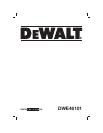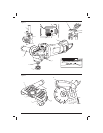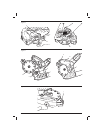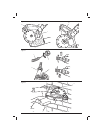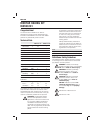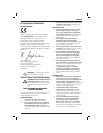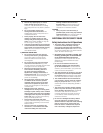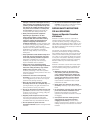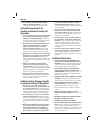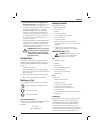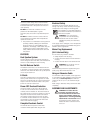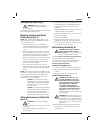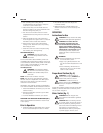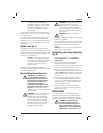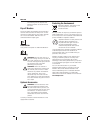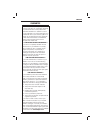
ENGLISH
36
e) Do not attach a saw chain woodcarving
blade or toothed saw blade. Such blades
create frequent kickback and loss of control.
Safety Warnings Specifi c for
Grinding and Abrasive Cutting-Off
Operations
a) Use only wheel types that are recommended
for your power tool and the specific guard
designed for the selected wheel. Wheels for
which the power tool was not designed cannot
be adequately guarded and are unsafe.
b) The guard must be securely attached to the
power tool and positioned for maximum
safety, so the least amount of wheel is
exposed towards the operator. The guard
helps to protect operator from broken wheel
fragments and accidental contact with wheel.
c) Wheels must be used only for recommended
applications. For example: do not grind with
the side of cut-off wheel. Abrasive cut-off
wheels are intended for peripheral grinding, side
forces applied to these wheels may cause them
to shatter.
d) Always use undamaged wheel flanges
that are of correct size and shape for your
selected wheel. Proper wheel flanges support
the wheel thus reducing the possibility of wheel
breakage. Flanges for cut-off wheels may be
different from grinding wheel flanges.
e) Do not use worn down wheels from larger
power tools. Wheel intended for larger power
tool is not suitable for the higher speed of a
smaller tool and may burst.
Additional Safety Warnings Specifi c
for Abrasive Cutting-Off Operations
a) Do not “jam” the cut-off wheel or apply
excessive pressure. Do not attempt to make
an excessive depth of cut. Overstressing the
wheel increases the loading and susceptibility to
twisting or binding of the wheel in the cut and
the possibility of kickback or wheel breakage.
b) Do not position your body in line with and
behind the rotating wheel. When the wheel,
at the point of operations, is moving away from
your body, the possible kickback may propel the
spinning wheel and the power tool directly at
you.
c) When wheel is binding or when interrupting
a cut for any reason, switch off the power
tool and hold the power tool motionless
until the wheel comes to a complete stop.
Never attempt to remove the cut-off wheel
from the cut while the wheel is in motion
otherwise kickback may occur. Investigate
and take corrective action to eliminate the cause
of wheel binding.
d) Do not restart the cutting operation in the
workpiece. Let the wheel reach full speed
and carefully reenter the cut. The wheel may
bind, walk up or kickback if the power tool is
restarted in the workpiece.
e) Support panels or any oversized workpiece
to minimise the risk of wheel pinching and
kickback. Large workpieces tend to sag under
their own weight. Supports must be placed
under the workpiece near the line of cut and
near the edge of the workpiece on both sides of
the wheel.
f) Use extra caution when making a “pocket
cut” into existing walls or other blind areas.
The protruding wheel may cut gas or water
pipes, electrical wiring or objects that can cause
kickback.
Additional Safety Rules
• Use of accessories not specified in this
manual is not recommended and may be
hazardous. Use of power boosters that would
cause the tool to be driven at speeds greater
than its rated speed constitutes misuse.
• Use clamps or another practical way to
secure and support the workpiece to a
stable platform. Holding the work by hand or
against your body leaves it unstable and may
lead to loss of control.
• Always use side handle. Tighten the handle
securely. The side handle should always be
used to maintain control of the tool at all times.
• Avoid bouncing the wheel or giving it
rough treatment. If this occurs, stop the tool
and inspect the wheel for cracks or flaws.
• Always handle and store wheels in a careful
manner.
• Never cut into area that may contain
electrical wiring or piping. Serious injury may
result.
• DO NOT cut metal with a diamond wheel.
• DO NOT use abrasive wheels.
• ALWAYS use with a dust collector.
• Do not operate this tool for long periods of
time. Vibration caused by the operating action
of this tool may cause permanent injury to
fingers, hands, and arms. Use gloves to provide
extra cushion, take frequent rest periods, and
limit daily time of use.



